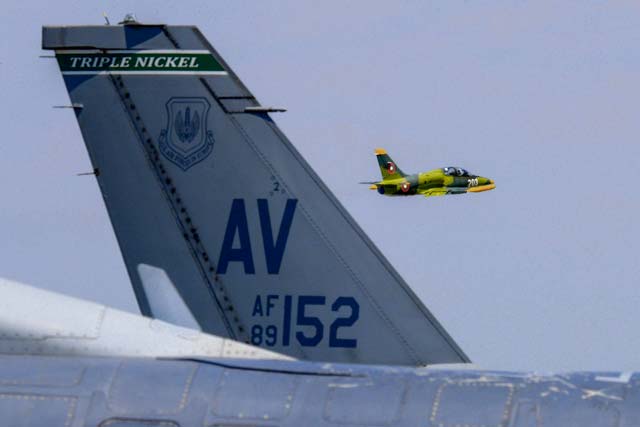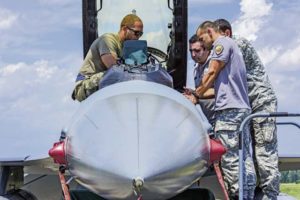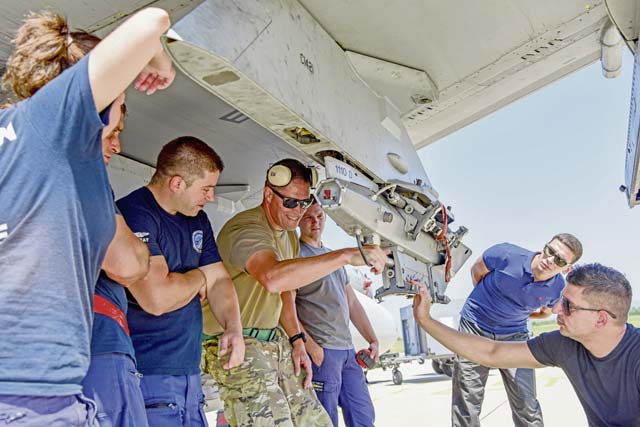GRAF IGNATIEVO AIR BASE, Bulgaria — More than 150 Airmen and eight F-16 Fighting Falcons assigned to the 555th Fighter Squadron, Aviano Air Base, Italy, participated in Thracian Star 21, a Bulgarian air force-led exercise aiming to enhance interoperability and the ability to rapidly deploy to remote locations, July 9-22.

Thracian Star 21 is a multilateral training exercise designed to increase operational capacity, capability and interoperability with the Bulgarian, Romanian and Hellenic air forces.
Training mission sets, during the exercise, included offensive and defensive counter-air, protection of high value assets, and close air support in a contested environment.
“We flew with the Romanian and Hellenic air forces, and then we flew against the Bulgarian air force SA-6 and SA-8 and that was a really great experience because we don’t have that kind of training at Aviano,” said U.S. Air Force Capt. Justin Goar, 555th FS F-16 pilot and project officer of Thracian Star 21. “Flying against a live emitter is a once in a lifetime opportunity for a lot of people, so it’s great training for us to come out here and fly against a real surface-to-air system.”

Airmen assigned to the 435th Construction and Training Squadron and 4th Combat Training Squadron, Ramstein Air Base, Germany, also participated in Thracian Star 21.
“We flew close air support with the Bulgarian SU-25s and that was the first time they’ve used U.S. JTACs (Joint Terminal Attack Controller) on the range and that was a highlight,” said Goar. “Normally they don’t use JTACs, but as a NATO country they could potentially find themselves working with JTACs and integrating with other NATO air-to-ground assets in the future especially once they get F-16s. That was interesting to see.”
During Thracian Star 21, the U.S. Air Force F-16s were able to employ a variety of munitions at the ranges in Bulgaria. They employed aircraft weapons systems with live ammunition helped service members maintain their familiarization with those systems.
The U.S. Air Force F-16s employed 27 inert training munitions, 180 rockets and approximately 7,000 rounds of 20 MM ammunition, said Tech. Sgt. Kyle Bubb, 31st Munitions Squadron stockpile management production supervisor.
Successful partnering exercises such as Thracian Star 21 result in progressive relationships and leads to tangible, mutual benefits during peacetime and contingencies through actions such as regional security, access and coalition operations.
“Exercises like Thracian Star are critical to the role we play at Aviano as a trusted NATO ally,” said U.S. Air Force Capt. Reid Chlasta, 31st Aircraft Maintenance Squadron officer in charge. “Integrating with our Bulgarian counterparts gives us new perspectives and shows us where and how we can multiply our strengths, especially in functions that directly impact our sortie generation capabilities.”
Bulgaria has established an internal F-16 training program for pilots and maintainers with focused objectives including, but not limited to: F-16 procurement, operation, and sustainment as well as strengthening the Bulgarian air force’s relationship with F-16 regional users and the U.S. Air Force.

“We are eager to have them and we expect in maybe three or four years for the first F-16s to get here and one of the latest modifications, so it will be a really really nice aircraft,” said Bulgarian air force Maj. Petar Milkov, L-39 Albatros instructor pilot and Thracian Star 21 project officer. “We’re supposed to get a total of total aircraft. We already have a contract for the first eight and we already have some of our pilots in the U.S. getting their initial F-16 training.”
Bulgaria seeks to have an active NATO, interoperable, and multirole fighter squadron that participates in multinational fighter exercises.
“In previous years, we flew together in joint missions, and I could say that it’s very positive for us,” said Milkov. “I hope that we can participate in more and more exercises, Thracian Star is the largest one.”
U.S. Air Force members conducted different F-16 familiarization training to include hydrazine emergency response procedures and armament system familiarization procedures, with Bulgarian air force members on U.S. Air Force F-16s.
“We were just partnering with the Tennessee National Guard and they’re out here to help train the Bulgarian fire department,” said Tech Sgt. Steven Rousseau, 31st Civil Engineer Squadron fire department assistant chief of operations. “We all collaborated together, because we have the F-16 aircraft. We went over emergency response procedures and the safest way to help make that aircraft fire safe, so that the maintainers and mechanics can do their job.”
Participation in Thracian Star 21 offers an opportunity for Airmen to train and hone in on operational and tactical skills.
“Thracian Star gave us the opportunity to build munitions and rockets as well as work with our maintenance counterparts to hone our ACE (Agile Combat Employment) concept skills and further develop multi-capable Airmen,” said Staff Sgt. Pierre Johnson-Alexander, 31st Munitions Squadron inspector.
Continual exercises like Thracian Star 21 and interactions between allied and partner forces allow allied forces to work together as a team to address security threats and enable all participants to contribute to international coalitions.
“We already built the personal relationships so when the Bulgarians get F-16s in the future it will be a matter of refining the tactics,” said Goar. “We should be able to integrate even more closely at that point so that is why I am excited about participating in future Thracian exercises.”








